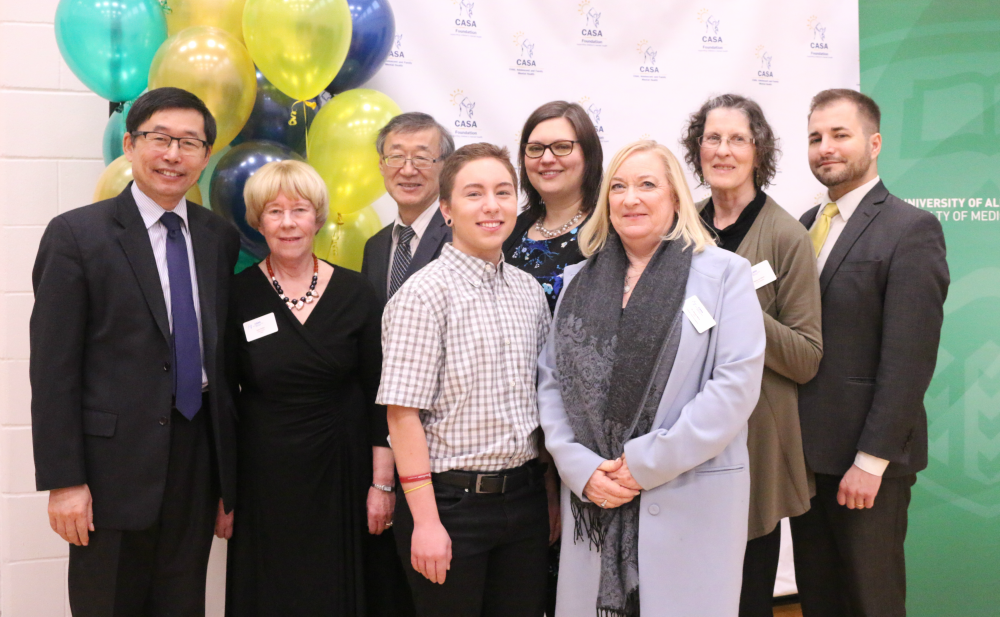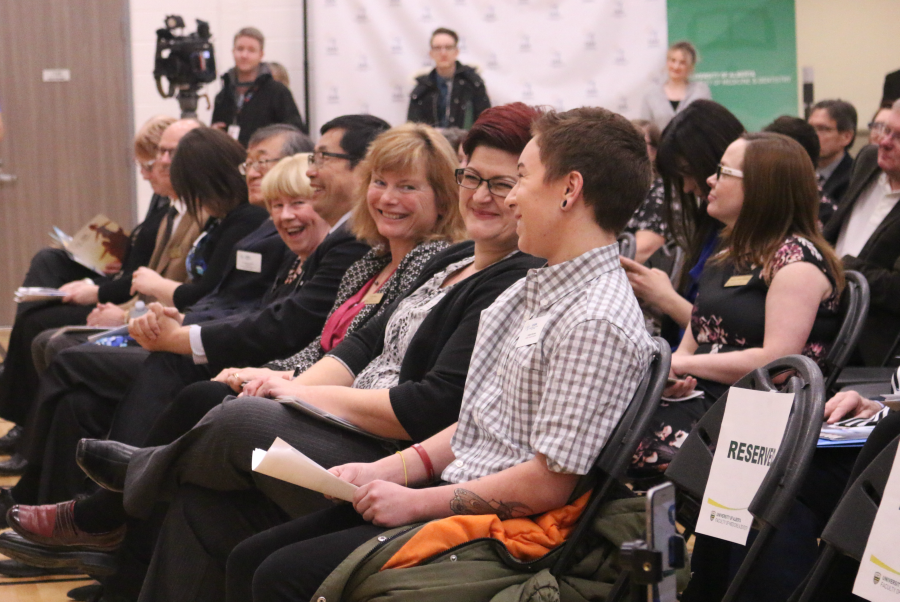
CASA and the Department of Psychiatry in the U of A's Faculty of Medicine & Dentistry have announced the creation of the CASA Research Chair in Child and Adolescent Mental Health. Pictured (left to right) are Xin-Min Li, Faye Parker, Dennis Kunimoto, Caleb Chomay, Brandy Payne, Denise Milne, Margaret Shone and Scott Phillips.
New resources to help children and youth with mental health and addiction issues will be developed in Alberta thanks to a $5-million gift.
CASA, a child, adolescent and family mental health organization, announced it was committed to providing the funds to the University of Alberta's Department of Psychiatry in the Faculty of Medicine & Dentistry to develop a new CASA Research Chair in Child and Adolescent Mental Health.
The new chair will help drive community-focused research and apply evidence-based findings to front-line care with an aim of improving the lives of children and youth with mental health and addictions issues.
"There are all kinds of gaps in the area of youth mental health," said Denise Milne, CEO of CASA. "We see a variety of children struggling with mental health challenges ranging from eating and sleeping disorders, to attention deficit disorder, to depression and anxiety. Through the CASA Research Chair in Child and Adolescent Mental Health we have a chance to generate expertise within the province of Alberta that hasn't previously been available."
"CASA is a tremendous partner in supporting and treating children's mental health, and this new collaboration with the University of Alberta is a wonderful opportunity to bring leading-edge research to the front lines," said Brandy Payne, Associate Minister of Health. "Strengthening mental health services for children and teens is a priority for our government, and we welcome work to increase the knowledge and research base around this very important issue."
The 10-year agreement will enable the U of A to recruit leading psychiatric researchers to Edmonton and increase community engagement to shape research priorities to ensure Alberta's mental health services adapt to changing community needs.
An international search is underway to find a suitable candidate with the aim to have the CASA Research Chair in place within the next year. Two other clinician-scientists will also be hired to support the position.
Milne said investing in the CASA Research Chair will help find answers to many questions.
"'What kind of treatment works and for whom? What are the best ways for people to access this care? What do families value in their care?' By understanding these issues, we'll be able to make improvements to the care we provide, and consequently to family and child outcomes."
"I'm very excited about this gift. It will be transformative," said Xin-Min Li, chair of the U of A's Department of Psychiatry. "This research chair will focus on clinical research and quality of care. It will be world-class and have a direct impact on front-line practice. Together with CASA, we'll establish a leading education, training and research centre in Canada for youth mental health."
Healthy kids become healthy adults
According to the Mental Health Commission of Canada, an estimated 1.2 million children and youth in Canada are affected by mental illness-yet, less than 20 per cent will receive appropriate treatment. By age 25, approximately 20 per cent of Canadians will have developed a mental illness.
"It's truly important to address these issues early on in life because we don't want our children to take these issues into adulthood," said Milne. "It impacts their employment, relationships and choices they make. We need to get to our kids younger to support them through their challenges and struggles so they can have healthy and productive lives."
It's a sentiment 19-year-old Caleb Chomay is quick to agree with. An active member of the CASA Youth Council, Chomay recalls experiencing social anxiety and mild to severe depression as early as five years old.
"It started to increase, especially in junior high and high school as I started to get older," he recalled. "I just found that anxiety and depression were really impacting my life. It made schoolwork very challenging. It made going out very difficult. I had problems making friends because I wasn't a very social person due to anxiety."
Chomay eventually sought out help to address the mental health issues he was facing and now finds himself in a much better mental space. He believes having a dedicated research program will help both youth and their health care providers address problems sooner and more effectively.
Putting families at the core of research
A key aim of the CASA Research Chair will be to collaborate with both youth and parents to gain new insights and solutions. For Candace Fehr, co-chair of the CASA Family Advisory Council, it's a partnership she is looking forward to.
"My hope is that there will be time and effort to research things like parents helping parents or peer support groups," said Fehr.
Fehr became involved with CASA after her daughter began to self-harm several years ago. She recalls feelings of frustration and helplessness as she struggled to understand what her daughter was going through and how she as a parent could help. She's a firm advocate for parents being more involved in the decisions impacting their children who are experiencing mental health problems.